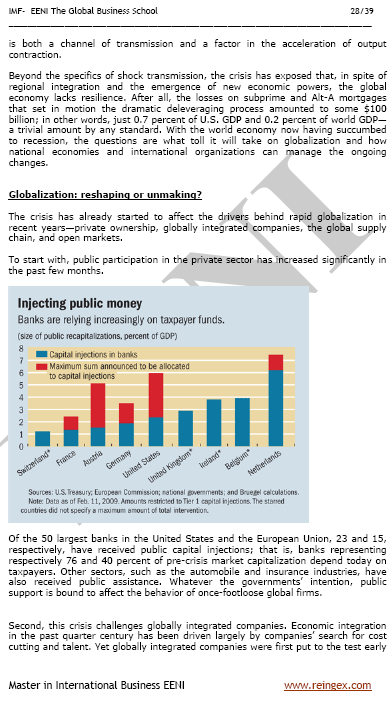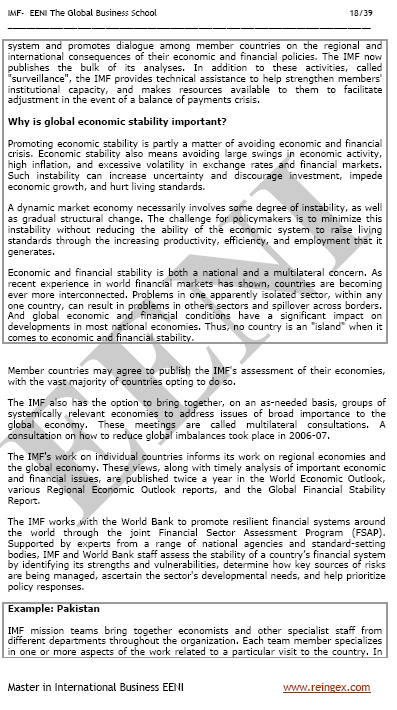International Monetary Fund

International Monetary Fund (IMF). Globalization and Global Crisis
- Introduction to the IMF
- Member states of the IMF
- Organization of the IMF
- Main activities and goals of the International Monetary Fund
- Surveillance
- Assistance
- Lending
- Collaboration with other institutions (World Bank, WTO, UN...)
- Fight against the money laundering (corruption)
- Special Drawing Rights (SDR)
- International Monetary Fund: Globalization, COVID and crisis.
- Role of the IMF in the global economic crisis and pandemia
- World Economic Outlook
The objectives of the subject “International Monetary Fund (IMF)” are the following:
- To understand the goals and organization of the IMF
- To analyze the main areas of activity of the IMF (supervision, technical, and financial assistance)
- To understand the concept of “Special Drawing Right (SDR)”
- To know the IMF role in the global economic crisis and the global financial stability
- To learn to use the macroeconomics information provided by the IMF
- To analyze the role of the International Monetary Fund in the world trade
International Monetary Fund (IMF):


The Subject “International Monetary Fund (IMF)” belongs to the following Online Programs taught by EENI Global Business School:
Masters: International Business, Foreign Trade.
Languages:  or
or  Fondo Monetario Internacional FMI
Fondo Monetario Internacional FMI  Fonds monétaire international FMI.
Fonds monétaire international FMI.


International Monetary Fund.
The International Monetary Fund (IMF) is an organization of 189 countries, working to:
- Promote the global monetary cooperation
- Secure the financial stability
- Make the Foreign Trade easy
- Promote a high employment and sustainable economic growth, and
- Poverty reduction
The International Monetary Fund is uniquely placed to help to the governments of the IMF members to take advantage of the opportunities and manage the defiance posed by the Globalization and the economic development.
The International Monetary Fund tracks the global economic trends, and efficiency alerts its member countries when it sees troubles on the horizon, provides a forum for the policy dialogue, and passes the know-how to the governments on how to tackle the economic difficulties.
Helping a nation benefit from the Globalization while averting the potential downsides is an important task of the IMF.
The global economic crisis has highlighted just how interconnected have become the countries in the world economy.
To become an IMF member, a nation must apply and then be accepted by a majority of the existing members.
The SDR (Special Drawing Rights) is an international reserve asset, created by the IMF in 1969 to supplement its member countries' official reserves. Its value is based on a basket of four key International currencies, and Special Drawing Rights can be exchanged for freely usable currencies.
Area of Knowledge: Globalization.
The member countries of the International Monetary Fund (IMF) are Afghanistan, Albania, Andorra, Algeria, Angola, Antigua and Barbuda, Argentina, Armenia, Aruba, Australia, Austria, Azerbaijan, Bahamas, Bahrain, Bangladesh, Barbados, Belarus, Belgium, Belize, Benin, Bhutan, Bolivia, Bosnia and Herzegovina, Botswana, Brazil, Brunei, Bulgaria, Burkina Faso, Burundi, Cambodia, Cameroon, Canada, Cape Verde, Central African Republic, Chad, Chile, Colombia, Comoros, DR Congo, Costa Rica, Ivory Coast, Croatia, Cyprus, Czech Republic, Denmark, Djibouti, Dominica, Dominican Republic, Ecuador, Egypt, El Salvador, Equatorial Guinea, Eritrea, Estonia, Eswatini, Ethiopia, Fiji, Finland, France, Gabon, Gambia, Georgia, Germany, Ghana, Greece, Grenada, Guatemala, Guinea, Guinea-Bissau, Guyana, Haiti, Honduras, Hong Kong, Hungary, Iceland, India, Indonesia, Iran, Iraq, Ireland, Israel, Italy, Jamaica, Japan, Jordan, Kazakhstan, Kenya, Kiribati, Kosovo, Kuwait, Kyrgyz Republic, Laos, Latvia, Lebanon, Lesotho, Liberia, Libya, Lithuania, Luxembourg, Macau, Macedonia, Madagascar, Malawi, Malaysia, Maldives, Mali, Malta, Marshall Islands, Mauritania, Mauritius, Mexico, Micronesia, Moldova, Mongolia, Montenegro, Morocco, Mozambique, Myanmar, Namibia, Nepal, Netherlands, Netherlands Antilles, New Zealand, Nicaragua, Niger, Nigeria, Norway, Oman, Pakistan, Palau, Panama, Papua New Guinea, Paraguay, Peru, Philippines, Poland, Portugal, Qatar, Republic of the Congo, Romania, Rwanda, Samoa, San Marino, São Tomé, Saudi Arabia, Senegal, Serbia, Seychelles, Sierra Leone, Singapore, Slovakia, Slovenia, Solomon Islands, Somalia, South Africa, South Korea, Spain, Sri Lanka, Saint Kitts and Nevis, Saint Lucia, Saint Vincent and the Grenadines, Sudan, Suriname, Sweden, Switzerland, Syria, Tajikistan, Tanzania, Thailand, East Timor, Togo, Tonga, Trinidad and Tobago, Tunisia, Turkey, Turkmenistan, Uganda, Ukraine, UAE, UK, the U.S., Uruguay, Uzbekistan, Vanuatu, Venezuela, Vietnam, Yemen, Zambia, Zimbabwe.
- Andorra became the 190th member on 16 October 2020
- Not-Members: Cuba, Liechtenstein, Monaco and North Korea


